Why was there a debate over this year's T in the Park festival?
- Published
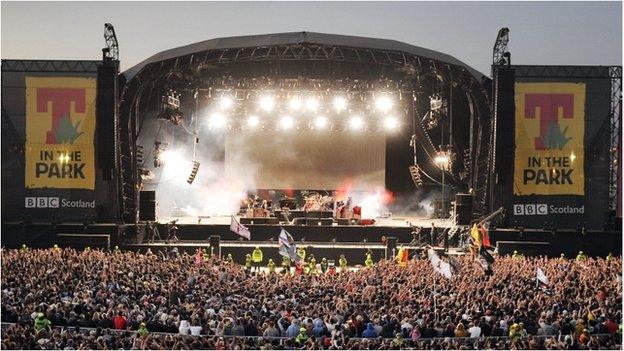
The festival had been held at Balado airfield since 1997
Perth and Kinross councillors have settled the long-running debate over whether this summer's T in the Park festival can be hosted at Strathallan Castle.
The bosses of Scotland's biggest music festival want to make the Perthshire estate its home this year and every year from now on.
However, locals say the matter has divided opinion in the area, wildlife groups have clashed with festival organisers, and thousands of comments were submitted during public consultations.
The council's development management committee unanimously approved the plans after hearing arguments from both sides - but only for the next three years.
Why the move to Strathallan?
Festival organisers DF Concerts decided to move on from Balado, the annual event's home since 1997, after "substantial" concerns were raised by the Health and Safety Executive about the Forties oil pipeline which runs underneath the site.
The group examined more than 100 potential sites across Scotland and the north of England, before settling on fellow Perthshire estate Strathallan.
They said the appealing natural setting of the estate was a key factor in the decision, alongside its central location and proximity to power lines.
The move was backed by part-owners of the estate, but has drawn criticism from some other local residents.
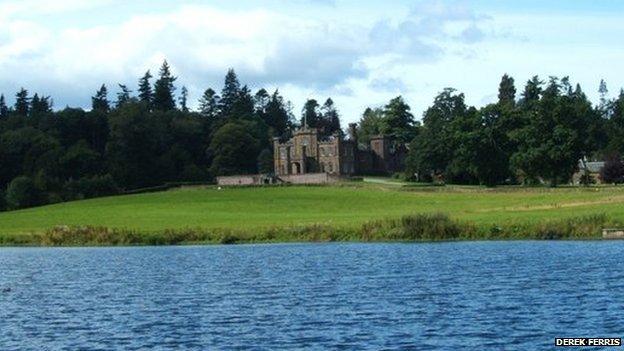
Part-owners of the Strathallan Castle estate backed the move, but some other locals were opposed
Why does a weekend-long festival need planning permission?
Initially it was argued that the event would only require full planning permission if it was on site for more than 28 days.
Most campers would arrive on Thursday 9 July, and leave on Monday 13 July, but several weeks of setting up and clearing up works would be involved on either side of the event itself.
Local residents raised concerns, and one couple who live on the doorstep of the proposed festival site wrote to the Scottish government asking them to intervene.
Ministers ruled that a full environmental impact assessment would need to be carried out ahead of planning consent being granted.
What were the key arguments for and against the plans?
Opponents of the move, such as the Strathallan T Action Group of local residents, said they were not against the festival, but think Strathallan is the wrong place for it.
They voiced concerns over local wildlife and watercourses, the effect on local tourism, and the suitability of local roads to handle tens of thousands of vehicles.
Supporters of the festival cited surveys which claim the event generates £15.4m for the Scottish economy each year, as well as £2.7m locally in Perthshire.
They also pointed to the event team's experience of planning and record of environmental protection at Balado.
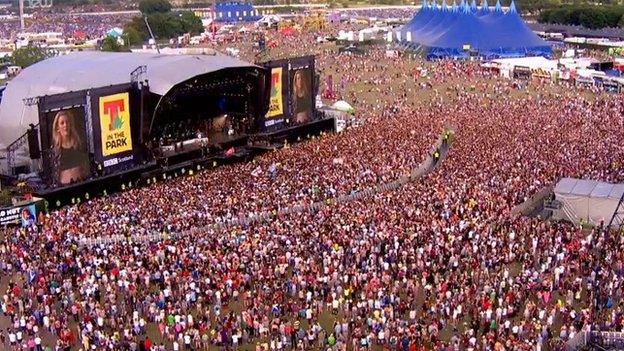
Up to 85,000 people visit the T in the Park festival each year
How have the public reacted?
An initial 28-day public consultation drew a mixed response from residents, with 273 letters of objection and 241 letters of support submitted.
A second public consultation was then held after fresh information was submitted to the council, this time prompting 1,351 objections and 552 letters of support.
In addition, a petition of 1,922 signatures supporting the plans was handed in to the council by DF Concerts, although the Woodland Trust Scotland ran their own petition in opposition.
T in the Park bosses also commissioned a survey of local residents by professional pollsters Survation, which claimed 62% of respondents backed approval of the plans, with 19% against and 19% undecided.
What about other groups?
There were no formal objections from statutory consultees, although Sepa did initially lodge concerns about flooding before settling matters with DF Concerts.
The owners of the Gleneagles Hotel spoke out about noise and traffic levels, citing "real concerns" about anti-social behaviour from unauthorised campsites and pedestrian traffic.
The issue of wildlife was the most controversial, with RSPB Scotland and the Woodlands Trust both issuing strong statements about an osprey nest at the site, an issue also raised by Scottish Natural Heritage.
Ospreys are a protected species, and anyone who disturbs them while nesting could face criminal prosecution.
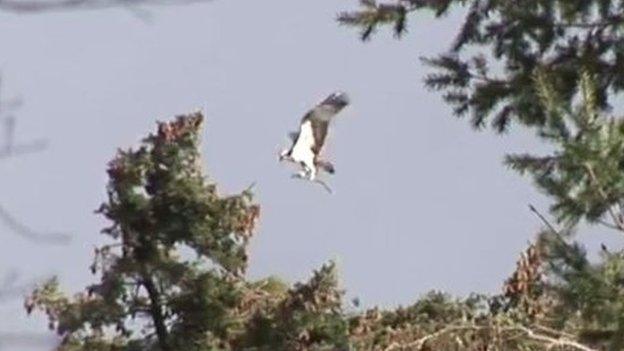
Ospreys which have been nesting in trees near the festival site are afforded special protection
So how are DF Concerts going to deal with the ospreys?
The initial plan was to move the birds to a new nest - one was specially constructed further away from the festival site, but festival bosses were unable to gain access to remove the original nest due to a disagreement with a landowner.
They instead tried to encourage the birds to avoid the old nest by setting up a cherry picker festooned with flags and balloons nearby. The move proved controversial, with RSPB Scotland describing it as "unethical and unacceptable", and police were even called in to investigate.
When it became clear the ospreys had settled at the old nest - prompting the swift removal of the cherry picker - DF Concerts sat down with RSPB Scotland to draw up plans to mitigate the potential impact on the birds.
This will see full-time monitoring of the nest by an on-site expert, a 500 metre buffer zone around the nest while chicks could be present, and bans on fireworks and any use of the access tracks nearby.
What about other wildlife and environmental concerns?
As well as the ospreys, DF Concerts put together specific protection plans for red squirrels, otters and bats.
There was also monitoring on site for other species including badgers, pine martens, kingfishers and barn owls, while RSPB Scotland recommended regular checks for ground nesting birds and red kites, another protected species which would require a buffer zone if found nesting near the site.
Festival organisers insist that they will do everything possible to protect the local environment, given that the estate's natural beauty was one of the key factors which attracted them.
The Roberts family, part-owners of the estate who have backed the plans, said that they are "conservationists at heart" and noted: "It's the beauty that brought DF Concerts here. They're not interested in desecrating that or decimating it - it's in their best interest and ours to maintain the environment that's here."
Planning bosses recommended banning any setup or clearing work taking place at night, and restrictions on the amount of light and noise overnight which could disturb animals nearby.
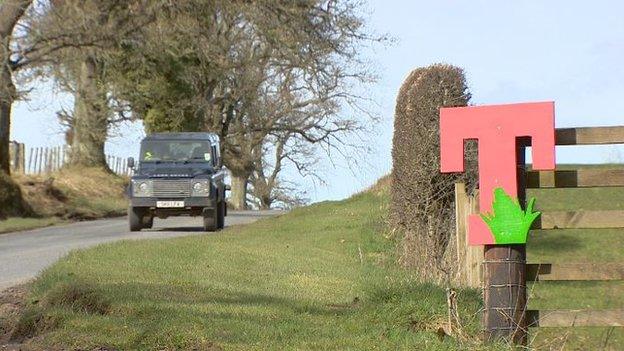
A number of conditions relating to traffic management were attached to the approval
Could traffic be an issue?
Local residents certainly think so, with the impact of some 85,000 music fans and 9,000 staff travelling to the rural site a common theme among consultation comments.
The council's transport planning group said there would be just under 69,000 vehicle movements during the festival, but noted that there is "sufficient road capacity" to handle this.
Yorkshire-based SEP Ltd, the traffic management firm who put the plans together, insist they are confident in their "scientific calculation" and models of traffic movement.
However, planning bosses said "delays and disruption" were likely on local roads, including a condition for approval that local routes should be surveyed and upgraded before and after the event, at the expense of the applicant.
What would have happened if councillors had rejected the application?
It was never entirely clear what would have happened if the plans had been thrown out by the development management committee - bands were booked months ago and tickets went on sale last year.
Prior to the decision, DF Concerts chief Geoff Ellis said the whole future of the event could be at stake if the Strathallan plans were rejected.
He told BBC Radio Scotland: "I don't think there is a venue, without going very far north in Scotland, which would be viable for T in the Park, so yes, I don't think it would carry on if we didn't host it at Strathallan this year."
In any case, the committee has not ruled on the long-term future of the event - councillors gave approval only for the next three years, so that the impact of the festival can be assessed.
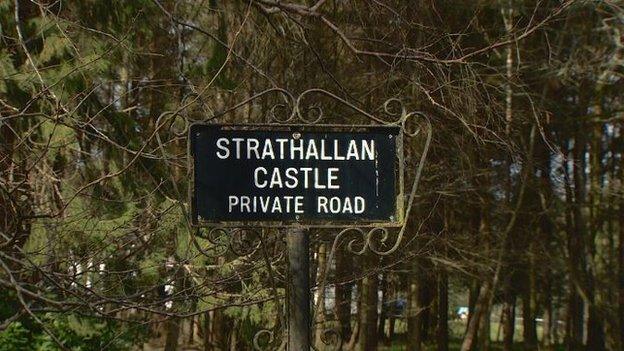
The estate was chosen after a search of more than 100 locations across Scotland and England
- Published1 May 2015

- Published24 April 2015
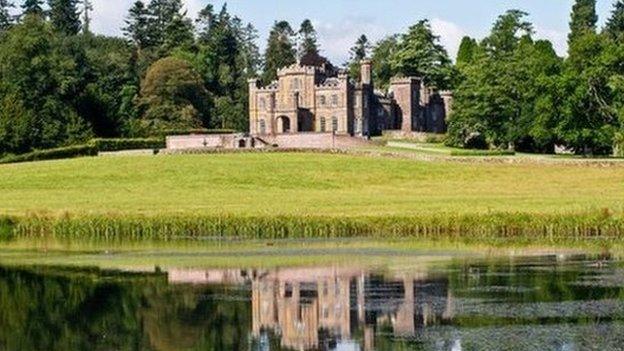
- Published11 April 2015
